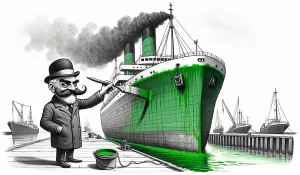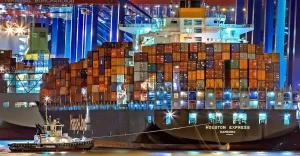Container shipping is the backbone of global trade. It’s also a significant contributor to global greenhouse gas (GHG) emissions. This is largely due to its size and the sheer number of vessels. One container ship can carry over 20,000 containers and emit 100,000 tonnes of GHG emissions in a year, as much as 20,000 cars. Keep in mind that there are more than 5,000 container ships in the global fleet. Vessel energy and fuel efficiency has improved in recent years, but more significant reductions are required to achieve the goals set forth in the Paris Agreement. The maritime sector must shift from heavy fuel oil (HFO) and diesel to zero- or low-emission fuels. That’s where ZEMBA comes in.
Alternatives to heavy fuel oil
There are many alternatives to HFO that could offer significantly fewer emissions. Alternatives include some types of biofuels, methanol, ammonia, and hydrogen.
Each of these fuels can be synthesized through multiple production pathways using a variety of feedstocks; the method of production dictates the total lifecycle emissions of the fuel. Despite these potential climate benefits, these fuels are not yet widely used within the maritime sector. According to the DNV Alternative Fuel Insights platform, as of January 2024, 99.4% of the global fleet is using fuels like HFO and diesel, 99.9% if you include LNG.
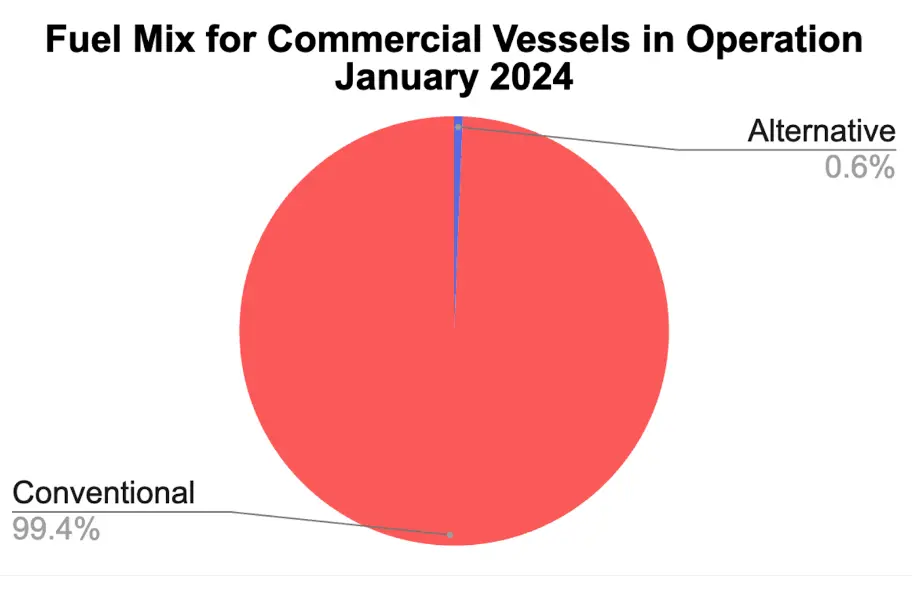
The shipping sector is slowly changing course however, due in part to handful of shipping companies. Major players in container shipping, including Maersk, Evergreen, and CMA, have taken steps towards methanol as an alternative to heavy fuel oil. These shipping companies have placed orders for “methanol-ready” ships that can use either methanol or traditional marine fuel oil. This dual-fuel optionality is a hedge, giving vessel owners fuel flexibility as technology and regulations evolve. Other shipping companies are taking notice. In 2023 ship construction orders for new methanol-ready ships surpassed orders for LNG-fueled vessels. Within the next three years there are likely to be more than 200 methanol-ready ships operating.
However, being methanol-ready does not guarantee the use of methanol fuel, or that the methanol is low-emissions. Ultimately, the ship’s fuel choice will depend on market conditions like fuel price and demand. Zero-emission fuels are currently produced in relatively low-volumes, and are likely to cost more than conventional heavy fuel or marine diesel oil in the short-term until economies of scale kick-in and drive down prices. Aggregating and concentrating demand for these fuels can accelerate the process.
Shifting the paradigm
How can the maritime industry accelerate the adoption of zero-emission fuels? Regulations can help. But this can be slow, especially when managed at the international level as is done through the International Maritime Organization (IMO). Another answer lies in activating demand throughout the maritime value chain, particularly from those that pay for shipping services, known as shippers.
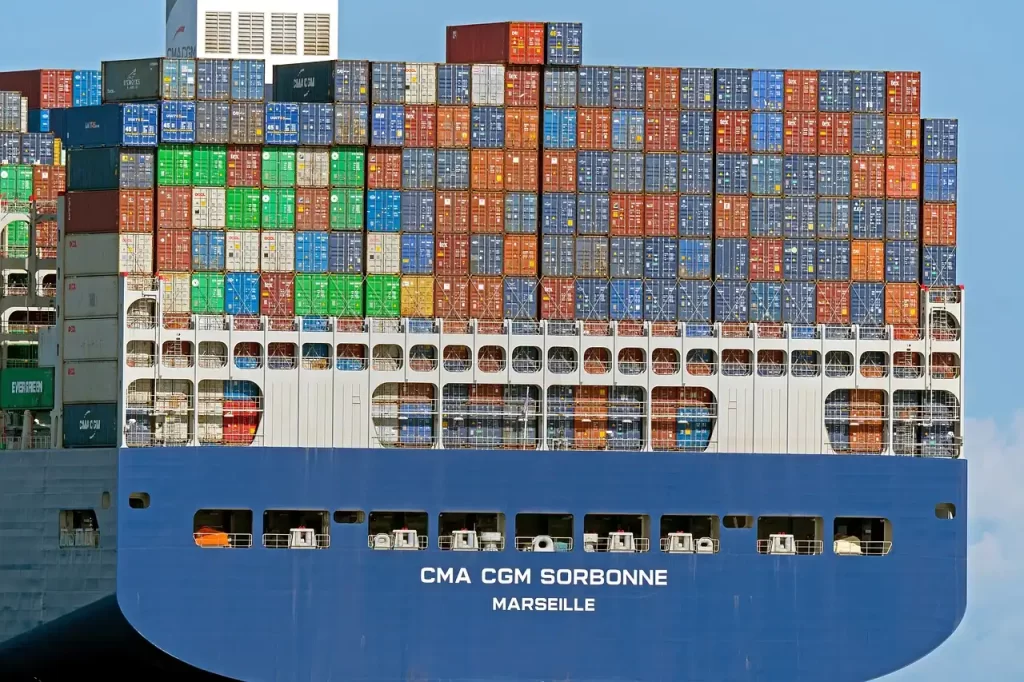
Ocean carriers are businesses that sell their transport services to other companies. On a ship that carries 20,000 containers (measured in twenty equivalent units, or TEUs), hundreds or thousands of companies’ cargo might be on a single ship.
Any given shipper represents a minuscule amount of cargo volume in the global context. Even large home improvement companies which represent one of the largest importers into the US are still estimated to represent less than 0.3%, of total container volume. Any one of these shippers is a small demand signal by themselves, but when they work together and aggregate their demand for low-carbon shipping options it creates a much more powerful signal for change.
Aggregating demand though ZEMBA
The Zero Emission Maritime Buyers Alliance (ZEMBA) was formed in 2023 to bring together cargo-owners that want to accelerate commercial deployment of zero-emission shipping solutions. Organized by the Aspen Institute’s Cargo Owners for Zero Emission Vessels (coZEV) initiative, ZEMBA currently boasts a membership of over twenty-eight influential companies who utilize container shipping services, including Patagonia, Tchibo, IKEA, Amazon, Flexport, lululemon, Levi Strauss, and Brooks Running.
ZEMBA operates as a buyers alliance, pooling the demand of member companies for zero-emission shipping. In the fall of 2023, ZEMBA released a request for proposals (RfP) for 600,000 TEUs over a three-year period on ocean vessels powered by zero-emission fuels. ZEMBA’s objective through this RfP is not only to leverage economies of scale for preferential pricing for its members, but also to drive the adoption of sustainable practices across the maritime sector. 600k TEU is still a small percentage of global container volume, but this is a crucial first step toward demonstrating demand from multiple cargo owners. If all goes well, ZEMBA will scale in volume through additional RfPs and contracts.
“ZEMBA’s RfP is seeking to support a nascent market through open competition,” Irigoyen explains. “As the ZE [zero-emission] shipping market grows and adequate policy support is enacted, we expect the market price for ZE shipping services to decrease. First mover action now is essential to ensuring those conditions are reached as quickly as possible.”
The book and claim system
Recognizing the present limited availability of zero-emission ships and fuel, ZEMBA will employ a chain-of-custody accounting methodology known as book and claim. This methodology assures transparency, credible emissions reductions, and logistical flexibility for member companies. This innovative approach separates the physical fuel from its climate benefits, allowing the benefits to be bought and sold as certificates. In practice, the more expensive low-emission alternative fuel is used by ships that can actually burn it on whatever trade routes they operate, while the certificates are purchased by cargo owning companies seeking to lower their corporate greenhouse gas footprint.
“During this early phase of shipping’s decarbonization journey, a widely-accepted, credible book and claim system is essential. In the absence of such systems, we risk stymieing demand just when we need it most at the start of the energy transition,” says Irigoyen.
“With ZEMBA’s current RfP, we’re requiring bidders to agree to use a book and claim system of ZEMBA’s choosing so that members can maintain logistical and transportation flexibility while reducing their Scope 3 emissions. While a members’ exact containers may not end up on the vessel powered by zero-emission fuels, ZEMBA members are confidently able to invest in the sector’s decarbonization through zero-emission fuels and have a greater impact than if they acted alone.”
ZEMBA and maritime goals
ZEMBA’s ultimate goal is to accelerate the adoption of zero-emission fuels in the maritime sector. The widely acknowledged aim for the maritime sector is to see at least 5% of global maritime fuel consumption sourced from zero-emission fuels by 2030. ZEMBA will not single-handedly achieve this goal for the entire maritime sector. But if ZEMBA succeeds in its mission, its impacts on the broader sector by the end of this decade could be substantial, and create a snowball effect of increasingly larger numbers of cargo-owners seeking zero-emission shipping options.
“Ultimately, ZEMBA’s goal is to catalyze a robust, competitive zero-emission shipping market and enable economies of scale, thereby accelerating the time for such options to become cost competitive with traditional fossil fuel-based shipping,” Irigoyen concludes.
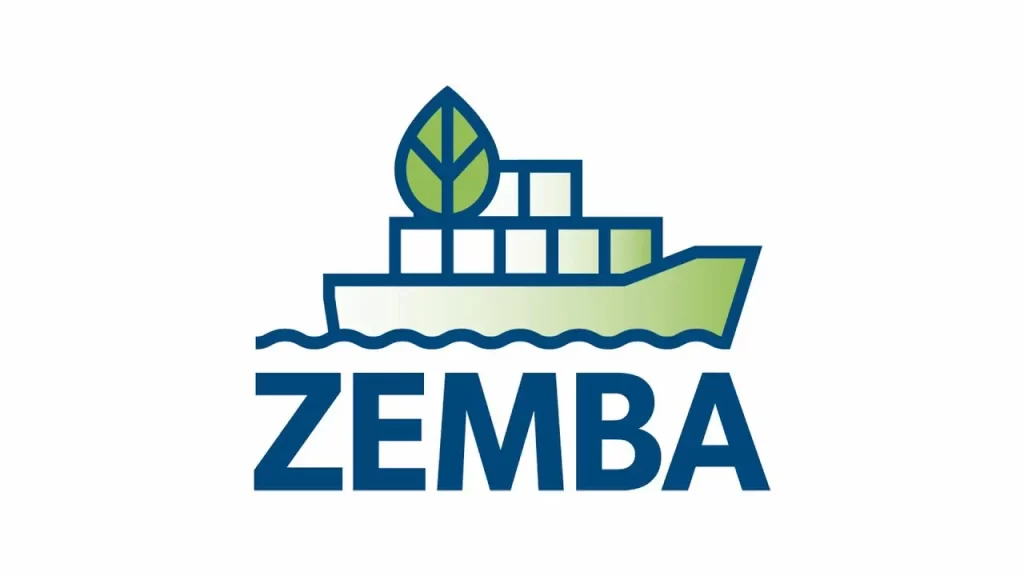
“At that point, zero-emission shipping should become the default choice for customers and ZEMBA’s mission will be complete.”
ZEMBA members stand as proof that there is demand from some of the world’s largest companies for ships using zero-emission fuels. ZEMBA continues to gather momentum and there is an open invitation for other companies to join this transformative movement. Interested parties are encouraged to visit the ZEMBA website to learn more about the initiative and how to join.
Through collaboration and demand-driven change, ZEMBA is spearheading a revolution in container shipping, proving that the power to transform lies in the hands of those who seek a greener, more sustainable future.
References
- Faber at al. Fourth IMO GHG Study. International Maritime Organization, 2020
- UMAS. “4th IMO GHG Study: Some answers to specific questions”
- DNV Alternative Fuels Insight Platform. Accessed Jan 27, 2024
- All Brands on Deck. Rose et. al, 2023. Ship it Zero Campaign.
- Aspen Institute. Cargo Owners for Zero Emission Vessels

